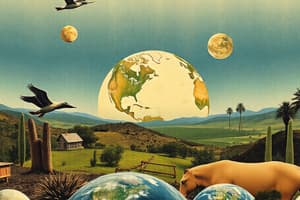Podcast
Questions and Answers
What term describes the ability of an ecosystem to remain in equilibrium despite disturbances?
What term describes the ability of an ecosystem to remain in equilibrium despite disturbances?
- Ecosystem resistance
- Equilibrium factor
- Dynamic resistance (correct)
- Steady state resilience
In ecosystem ecology, what is the term used to describe the gradual replacement of one community by another over time?
In ecosystem ecology, what is the term used to describe the gradual replacement of one community by another over time?
- Community transformation
- Equilibrium shift
- Succession (correct)
- Community revolution
What are the two main components of an ecosystem?
What are the two main components of an ecosystem?
- Biotic Factors and Abiotic Factors (correct)
- Producers and Consumers
- Rain and Soil
- Methanogens and Lithosphere
Which sphere of the Earth is defined as a zone of inhabits for all living things?
Which sphere of the Earth is defined as a zone of inhabits for all living things?
What type of disturbances are considered as usual in ecosystems?
What type of disturbances are considered as usual in ecosystems?
What is the process of breaking down or dissolving of minerals or rocks called?
What is the process of breaking down or dissolving of minerals or rocks called?
Which term describes the speed at which an ecosystem recovers its equilibrium after being disturbed?
Which term describes the speed at which an ecosystem recovers its equilibrium after being disturbed?
Which component of an ecosystem includes herbivores, carnivores, and omnivores?
Which component of an ecosystem includes herbivores, carnivores, and omnivores?
What is the main function of an ecosystem in regulating ecological processes and supporting life systems?
What is the main function of an ecosystem in regulating ecological processes and supporting life systems?
What is the main function of Methanogens in the ecosystem?
What is the main function of Methanogens in the ecosystem?
Which term is used to describe the energy that is at rest and waiting to be used?
Which term is used to describe the energy that is at rest and waiting to be used?
Why do animals go extinct according to the text?
Why do animals go extinct according to the text?
Flashcards are hidden until you start studying
Study Notes
Ecosystem
- An ecosystem is a system that consists of interacting organisms and abiotic pools linking together.
Biotic and Abiotic Factors
- Biotic factors: living things
- Abiotic factors: non-living things
The Four Spheres of the Earth
- Atmosphere: a mixture of gases
- Biosphere: the zone of inhabitation (where all living things can be found or reside)
- Lithosphere: the solid outermost layer of the earth (interchangeable with the term Geosphere, which is a broader term)
- Hydrosphere: water
Weathering and Precipitation
- Weathering: the process of breaking down or dissolving of minerals or rocks
- Precipitation: rain
Structure of Ecosystem
Biotic Components
- Producers
- Consumers: herbivores, carnivores, omnivores
- Decomposers
Abiotic Components
- Air
- Soil
- Sunlight
- Water
Ecosystem Processes and Dynamics
- Ecosystem processes are constantly changing due to fluctuations in the environment and activities of organisms on time scales ranging from microseconds to millions of years
- The ecosystem is an ecological system formed from the reciprocal relationship between living things and the surrounding environment
Evolution and Extinction
- Evolution: the process of change in the physical characteristics of organisms over time
- Extinction: the process of an organism dying out due to the inability of the environment to provide the necessary energy or food
Methanogens
- An example of bacteria that produces potent greenhouse gases and has a high energy level
- Can solve dual humanity problems: climate change and energy shortage
Ecosystem in Equilibrium
- A largely closed system dominated by internal recycling of elements
- Factors such as spacious interaction, climate, side condition, and nutrient availability are in harmony
- Equilibrium is subject to gradual changes due to natural processes like succession
Ecosystem in Non-Equilibrium
- Disturbance is a natural component of ecosystem dynamics
- Examples of disturbances: storms, fires, droughts, human activity
Steady State Equilibrium
- A balance between inputs and outputs to the system shows no trend with time
- Two parameters: resistance and resilience
- Resistance: the ability of an ecosystem to remain in equilibrium in spite of disturbances
- Resilience: the speed at which an ecosystem recovers its equilibrium after being disturbed
Ecosystem Ecology
- Addresses the interactions between organisms and their environment as an integrated system
- Ecology: a broader term that studies ecosystems
- Ecosystem: a subpart or unit of community organisms
Functions of an Ecosystem
- Regulates essential ecological processes, supports life systems, and renders stability
- Responsible for the cycling of nutrients between biotic and abiotic components
- Maintains a balance among the various trophic levels in the ecosystem
- Cycles minerals through the biosphere
- Abiotic components help in the synthesis of organic components that involves the exchange of energy
Energy Flow in Ecosystems
- Energy flows while nutrients cycle
- Energy is the ability to do work or heat objects
- Potential energy: energy at rest
- Kinetic energy: energy in motion
- Energy is neither created nor destroyed, only changed from one form to another
Studying That Suits You
Use AI to generate personalized quizzes and flashcards to suit your learning preferences.




